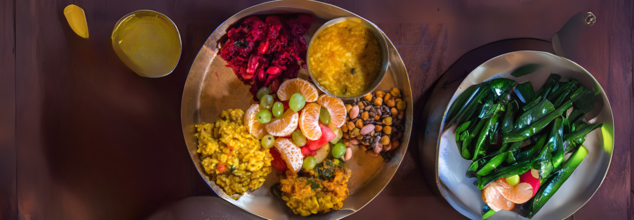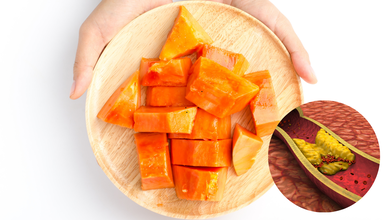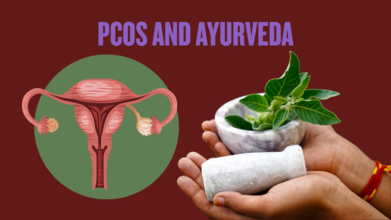- Health Conditions A-Z
- Health & Wellness
- Nutrition
- Fitness
- Health News
- Ayurveda
- Videos
- Medicine A-Z
- Parenting
Not Another Diet, Ayurveda’s ‘Ahar Vidhi’ Is The Simplest Fix To Chronic Bloating

Credits: Canva
Even with all the superfoods, supplements, and green juices we pursue, digestion problems still continue to bubble up—literally. But what if the fix isn't what you're eating but how you're eating? Meet Ayurveda's old but frequently forgotten know-how: Ahar Vidhi. It's not just another fad diet or cleanse. It's a thoughtful, body-listening ritual that's quietly revolutionizing contemporary gut health—one deliberate bite at a time.
In a wellness culture fixated on superfoods, restrictive diets, and cleansing juices, we tend to forget one simple fact: sustenance isn't just about what ends up on your plate, but how your body processes it. Ayurveda—the ancient Indian system of holistic medicine that is over 5,000 years old—has always highlighted this delicate yet potent truth through a philosophy called Ahar Vidhi, or the art and science of eating.
And in our times, when bloating is a virtual universal grievance, this ritual may be more applicable than ever before.
Poor diet, according to Ayurveda, is merely part of the problem; so is poor digestion—or Agni, the internal digestive fire. The idea is straightforward but revolutionary: even the most nutritious meals can become toxic if the body is not correctly digesting them.
“Most people are overfed but undernourished,” explains Dr. Arun Pillai, a wellness and Ayurvedic expert. “We tend to overeat and yet struggle with nutritional deficiencies—not always because of what we’re eating, but because our digestion is compromised. And digestion isn’t just physical—it’s emotional, mental, and behavioral too.”
The increase in digestive discomforts, particularly bloating, is a direct indicator of this imbalance. While it's normal to experience occasional bloating, chronic bloating—characterized by ongoing fullness, distention of the abdomen, or gas—usually indicates subpar digestive function. And as Dr. Pillai says, the solution isn't another elimination diet or supplement—it's Ahar Vidhi.
What Is Ahar Vidhi?
Literally meaning "the method of eating," Ahar Vidhi is more than calorie restriction or food pyramids. It's an Ayurvedic model that shows you how to eat with intention, presence, and rhythm—linking eating to mindfulness and natural body rhythms.
"If I had to prescribe one Ayurvedic regimen to every contemporary physician, it would be conscious eating," declares Dr. Pillai. "We're always eating in transit—standing up, in the car, while we're browsing on our phones, or during times of stress. That frenzy doesn't merely assault the mind; it actually damages digestion."
Some basic Ahar Vidhi tenets are:
- Consumption of food at predictable times, preferably in harmony with nature's internal circadian cycles.
- Sitting down to eat, instead of standing or walking around.
- Chewing slowly and thoroughly in order to stimulate digestion in the mouth.
- Staying focused, avoiding television time or tense conversations at the dinner table.
- Taking breaks after meals, allowing your body to stabilize before resuming activity.
These rules may be basic—but their effects are far from it.
"Individuals tend to be surprised by how subtle changes—such as chewing or turning off the TV during meals—can reduce cravings, promote digestion, improve energy, and even result in clearer skin," observes Dr. Pillai. "As we build our Agni, the body starts regulating itself."
Why Chronic Bloating Not Always About Food
Bloating occurs in about 10–20% of adults, and it's one of the most frequent reasons individuals visit their doctor—yet frequently, no condition is identified. This suggests there's a more fundamental problem: although food intolerance or imbalance of gut flora is involved, how and when we eat are just as important.
Dr. Pillai explains that bloating can result from improper meal timing, poor posture during meals, or emotional states such as anxiety during digestion. “The gut and brain are deeply connected. If you’re eating during a heated argument, your nervous system is in fight-or-flight mode, not rest-and-digest. Your digestion literally shuts down,” he says.
This makes Ahar Vidhi not only a digestive tool, but a nervous system regulation technique—a means of transforming each meal into a healing ceremony.
Can Doshas be Personalized?
Ayurveda notoriously categorizes people into three dosha types—Vata, Pitta, and Kapha—with individual propensities and imbalance profiles. While this tailoring is deep, it can seem daunting to the newcomer.
"Perfection and micromanaging aren't the goal," Dr. Pillai says. "Doshas provide knowledge, not limitation. A Vata individual gets cold and bloated, so warm, stabilizing foods are beneficial. Pitta types prefer cooling food. Kapha types require light, stimulating routines. But the key is always observation."
He recommends that individuals start by paying attention to their reactions to specific foods or dining settings, then slowly modifying their habits. "It doesn't have to be dramatic—perhaps you forgo the cold smoothie in winter or opt for lunch instead of a late-night snack. These small adjustments create genuine awareness and balance."
In an era where detox diets, fasting trends, and pricey probiotics are the talk of the wellness world, Ahar Vidhi is remarkable for its simplicity and affordability.
You don't require a fancy retreat or a cleanse to heal your gut," says Dr. Pillai. "Sometimes, the most significant change starts by simply sitting down, chewing slowly, and eating without distraction. Ayurveda teaches us that the medicine we need is often right in front of us—on our plates.
So the next time you reach for a cure to your bloating, your fatigue, your food intolerance, think about it, the answer might not be in what you're eating but in how you're eating.
Dr Arun Pillai is a Ayurvedic expert and Wellness Director at Dharana at Shillim in India
We Fact Checked The Ayurveda Claim Of Papaya Lowering Your Cholesterol, Details Inside

Credits: Canva
A simple fruit has suddenly become a health headline. After Ayurveda expert Acharya Balkrishna suggested that eating papaya daily may help control cholesterol, many people began seeing it as an easy natural fix for rising lipid levels.
It sounds comforting. No medicines, no complicated diets, just a bowl of fruit. But does science actually support the claim? Let’s break it down.
Read: Fact Check: Does TikTok's 'Chlorophyll & Collagen' Supplement Really Work?
We Asked The Expert
Health and Me spoke exclusively to registered dietitian Ginni Kalra, Head Dietetics at Aakash Healthcare, who clarifies the viral claim early on:
“Papaya is a fiber-rich fruit, and the soluble fiber and antioxidants present in it may help reduce bad cholesterol (LDL). However, it would not be correct to say that eating papaya alone can completely control cholesterol levels.”
She stresses that cholesterol management always depends on the overall diet and lifestyle. Apples, guava, pears, oats, green leafy vegetables, carrots, bottle gourd, beans, nuts, and seeds also play an important role along with exercise and weight control.
“Individuals with very high cholesterol levels or a higher risk of heart disease should not rely only on fruits. In such cases, medications may also be required under a doctor’s supervision,” she adds.
So the claim already moves from cure to support. Now let’s understand why papaya still gets attention.
Read: Fact Check: Doctors Bust Common Myths Around Epilepsy and Explain Why Early Treatment Matters
Why Papaya Is Getting Attention
Papaya has long been associated with digestion in Indian households. It is commonly recommended for constipation, acidity, and gut health. Now the focus has shifted toward heart health.
Cholesterol problems are rising rapidly, especially in urban lifestyles filled with sedentary work, processed foods, and stress. Naturally, people are drawn toward simple dietary solutions.
Papaya contains fiber, vitamin C, and antioxidants. These nutrients are known to support cardiovascular health. But the key question is: does that mean it can control cholesterol on its own?
The Fiber Connection
Fiber plays an important role in cholesterol management.
Soluble fiber binds with cholesterol particles in the digestive tract and helps remove them from the body before they enter circulation. Papaya contains dietary fiber, which supports digestion and may reduce LDL, commonly called “bad cholesterol”.
Read: Fact Check: Does Ja Morant Have Lung Cancer?
In simple terms, fiber acts like a natural cleaning system. It reduces absorption of unhealthy fats and improves gut function. This is one reason many nutrition experts encourage including fruits regularly in meals.
However, the effect is gradual and supportive, not curative.
Antioxidants And Heart Protection
Papaya is rich in vitamin C and antioxidants. These compounds help reduce inflammation and oxidative stress, both of which contribute to plaque formation in arteries.
Healthier blood vessels make it harder for cholesterol to deposit along artery walls. This lowers long-term risk of heart disease.
But antioxidants work as protectors, not erasers. They help prevent damage rather than reverse high cholesterol dramatically.
Key Takeaway
Papaya is beneficial, but it is not a magic cure. Cholesterol issues develop due to long-term lifestyle patterns including diet quality, physical inactivity, smoking, poor sleep, and stress.
Adding a small bowl of papaya daily can support heart health. But it works best as part of a broader routine: more fiber-rich foods, less fried food, regular exercise, and medical treatment when needed.
People with latex allergy, certain medical conditions, or pregnancy concerns should consult a doctor before consuming large amounts, especially unripe papaya.
Note: Please consult your nutritionist or a registered dietitian before making any changes to your doubts. Health and Me does not endorse this as a substitute to medically prescribed medicines for cholesterol or any other condition.
Ayurvedic Navel Oiling: The Best Oils To Choose, The Right Way To Do It And Why It Should Be a Part Of Your Everyday Routine

(Credit-Canva)
In the ancient healing system of Ayurveda, the belly button, known as the Nabhi, is considered a very important spot. It's seen as a central point of energy, health, and balance in the body. Applying warm oil to the navel is a simple but powerful self-care ritual that is believed to bring deep healing benefits to both the body and mind.
In modern science, our belly button holds little to no value, some even considering it a scar, as the only purpose it served was as a source of food for babies in the womb. However, considering it was the only source of nutrition we had, one wonders how it can lose its value outside the womb.
Also Read: What Is Leucovorin - The Drug Trump Suggests As A Treatment For Autism?
According to the California College of Ayurveda, navel oiling practice is based on the idea that the Nabhi is connected to our digestive system, or Agni, and helps spread energy throughout the body. By oiling it, you can nourish your core and bring balance to your body's three energy types, or doshas: Vata, Pitta, and Kapha.
Does Oiling Your Belly Button Actually Have Benefits?
For people who are just learning about this ayurvedic practice, this is the first question they ask. In a video, Smt. Hansa Ji from the Yoga Institute of India explained that the benefits of naval oiling are immense.
For Your Skin: Applying oils like coconut, sesame, or almond oil directly to the navel can help deeply hydrate the skin, making it less dry.
For Digestion: For issues like indigestion, bloating, or stomach pain, a mixture of ginger and peppermint essential oils with coconut oil can be applied. This practice is thought to reduce bloating and strengthen your digestive fire.
For Hormones: Gently warming castor oil and massaging it into your navel is believed to help balance hormones and reduce menstrual pain. For fertility concerns, some people use olive oil or guava leaf oil.
For Detoxification: Using neem or castor oil in the navel may help the body flush out toxins and support liver health.
Some other benefits, as mentioned by the California College of Ayurveda were,
For Pain Relief: A little warm castor oil on the navel may help reduce stomach cramps, menstrual pain, and stiff joints by balancing your Vata dosha.
For Eyes and Lips: Oiling the navel with pure ghee or mustard oil is said to improve eyesight and prevent chapped lips by nourishing your body from its center.
For Fertility: Applying ghee or coconut oil to the navel is believed to nourish the reproductive organs and boost overall vitality.
How to Choose the Right Oil
Different oils have different properties, so you can choose one based on what you want to achieve:
- Coconut oil is cooling and is great for balancing a Pitta imbalance.
- Sesame oil is warming and perfect for a Vata imbalance. It also helps with circulation.
- Mustard oil is known for its cleansing properties and benefits to digestion and joint health.
- Castor oil is a powerful healing oil that can help reduce pain and swelling.
- Pure ghee is very nourishing and helps to rejuvenate your body's tissues.
- Neem oil is great for cleansing and is often used for acne-prone skin or for detoxification.
How to Practice Navel Oiling
To do naval oiling one can start by warming up just 2-3 drops of your chosen oil. You can then lie down comfortably and apply the oil directly into your belly button. You can use a dropper for this.
After you are done putting oil in your naval, gently massage the area in a circular motion for about a minute. Leave the oil on overnight or for at least 30 minutes before you wash it off.
Remember to always use pure, high-quality, cold-pressed oils. If you have sensitive skin, it's a good idea to test a small patch of skin first. You should also avoid this practice if you have any infections or open wounds near your navel.
Adding navel oiling to your daily or weekly routine can have a powerful effect on your overall health, from improving your skin and digestion to balancing your hormones and emotional well-being.
Medical studies that support navel oiling
While studies directly linking naval oiling to health benefits are limited, a 2015 research published in the Asian Pacific Journal of Tropical Biomedicine, showed the usage of essential oils for navel oiling can help reduce stress, headaches, insomnia and muscle pain. Another 2023 article published in the Frontier explains how massaging your abdomen may improve your digestion and improve problems like constipation.
Note: Putting oil in your naval is unlikely to harm you but there are still chances of allergens being present or a specific oil not suiting your skin, causing you irritation. Make sure to do a skin patch test and take guidance from a medical professional for advice.
Can Ayurveda Restore Fix Fertility Issues In PCOS What Doctors Often Miss?

Credits: Health and me
For women grappling with fertility issues or irregular cycles, Ayurvedic practitioners often begin with something that feels surprisingly personal—understanding your prakriti, or unique body constitution. Instead of focusing solely on symptoms, the ancient system emphasizes balance: cleansing the body of toxins, restoring harmony among the three doshas, and gently resetting the system through lifestyle and herbal support. For women with polycystic ovarian syndrome (PCOS), this individualized approach can feel like finally being seen, not just diagnosed.
Conventional medicine has made enormous strides in managing health conditions, but when it comes to PCOS, most treatments stop at controlling symptoms with hormone pills, insulin sensitizers, or surgical interventions. The root causes—sluggish metabolism, chronic inflammation, and stress-driven hormonal chaos often remain unaddressed. This is where Ayurveda steps in, not as a replacement but as a deeper, more integrative path to healing.
“PCOS isn’t viewed only as a hormonal disorder; it’s seen as a reflection of deeper imbalances within the body,” says Dr. Manoj Kutteri, Ayurvedic expert in nutrition, acupuncture, yoga, and physical culture. “These imbalances can affect digestion, metabolism, and even mental and emotional well-being.”
Instead of targeting one hormonal pathway, Ayurveda examines the full picture: how your gut is functioning, whether your body can efficiently remove toxins, and how emotional stress shows up physically. This perspective transforms treatment from surface-level management to whole-body healing.
What Is The Role of Doshas in PCOS?
At the core of Ayurveda lies the concept of doshas—Vata, Pitta, and Kapha. Everyone carries all three, but in different proportions. PCOS is often linked to Kapha imbalance, which manifests as weight gain, irregular cycles, slow metabolism, and excess fluid retention. Still, no two women with PCOS present exactly the same way.
“By identifying your individual balance of these energies, Ayurveda designs a treatment plan that’s personalized to you, rather than relying on a one-size-fits-all approach,” Dr. Manoj explains.
For one woman, reducing Kapha heaviness through lighter, warming foods may bring relief. For another, calming Vata might be more important to regulate cycles and ease anxiety. The process is highly individual.
Detox as a Reset Button
A cornerstone of Ayurvedic care for PCOS is detoxification, or Shodhana Kriya. Unlike fad cleanses, these are gentle, physician-guided therapies aimed at clearing ama, toxic buildup that clogs the body’s channels and disrupts hormonal flow.
“Gentle Ayurvedic detox therapies help get rid of ama, which is built-up toxins that block different channels in the body and throw off the balance of hormones,” says the expert. Panchakarma, a series of cleansing therapies, may be recommended in clinical settings, while at-home practices like drinking warm herbal teas, body exfoliation, and mindful eating, serve as accessible daily rituals.
This cleansing process is less about deprivation and more about renewal. By unblocking energy channels and supporting digestion, detox helps the body find its rhythm again.
Lifestyle as Medicine
Unlike quick fixes, balancing the doshas requires sustained changes across all areas of life. Sleep, food, emotional state, and even how you process stress are all seen as part of the healing process.
“You must implement major, mindful lifestyle changes,” Dr. Manoj notes. “Everything from the type of food you eat to the quality and number of hours that you sleep, how you feel emotionally, how you deal with the stress in your body, and self-analysis, everything comes into the picture.”
Herbs such as Shatavari, Asoka, Punarnava, Guduchi, and Triphala often appear in treatment plans. But Ayurveda never prescribes herbs in isolation—they’re always woven into a broader program of nutrition, movement, and emotional balance.
Daily routines also play a central role. Eating freshly prepared meals, practicing gentle yoga, keeping regular sleep schedules, and cultivating emotional awareness aren’t just lifestyle “tips”; they’re considered medicine.
What Are The Signs of Healing from PCOS?
Ayurveda frames healing as a journey rather than a destination. Women with PCOS may first notice subtle shifts lighter digestion, more energy in the mornings, or a steadier emotional state. Over time, cycles regulate, skin clears, and metabolism steadies.
“Ayurveda encourages women with PCOS to listen and understand their bodies, restore their natural rhythm and harmony, and reconnect with their natural vitality and inner self,” says the expert. This philosophy reframes PCOS not as a lifelong battle but as an opportunity to deepen self-awareness and resilience.
Globally, PCOS has become one of the most pressing reproductive health issues, affecting up to 1 in 10 women of childbearing age. With rising rates linked to lifestyle, diet, and environmental stress, the condition demands more than band-aid solutions. Ayurveda’s individualized, root-cause approach offers a complementary path one that empowers women to take charge of their health and fertility.
What this really means is that Ayurveda doesn’t replace modern medicine, but it fills in the gaps addressing the subtle but crucial links between digestion, metabolism, stress, and reproductive health. For many women, this integrated lens offers both hope and tangible results.
PCOS can feel overwhelming, especially when conventional treatments focus narrowly on managing cycles or insulin resistance. Ayurveda broadens the view, inviting women to see their condition not as a permanent burden but as a signal to restore balance physically, emotionally, and spiritually. Healing isn’t instant, but it is possible, when the focus shifts from suppressing symptoms to nurturing the whole self.
Dr. Manoj Kutteri is a Ayurvedic and wellness expert with a comprehensive background in Mind-Body Medicine, Nutrition, Acupuncture, Yoga, and Physical Culture- Medical Director & CEO of Atmantan Wellness Center in India
© 2024 Bennett, Coleman & Company Limited

